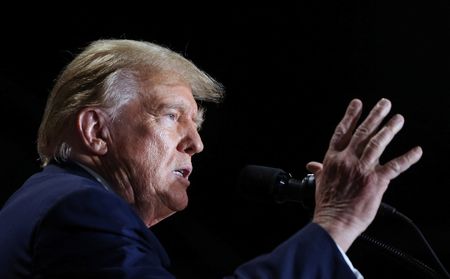By Andrew Goudsward
WASHINGTON (Reuters) -Donald Trump suffered a pair of legal setbacks on Thursday as judges spurned his calls to dismiss criminal charges over the former U.S. president’s efforts to overturn his 2020 loss in Georgia and his keeping classified records after leaving office.
Separately, one of the Republican presidential candidate’s allies, former Justice Department official attorney Jeffrey Clark, faced the risk of disbarment after a Washington panel found he violated some attorney ethics rules in his attempts to enlist the agency to help overturn Trump’s loss.
Those cases represent just some of the legal entanglements facing Trump, who has been criminally charged in four cases as he challenges Democratic President Joe Biden in the Nov. 5 election, with the first-ever trial of a sitting or former U.S. president due to get underway in New York on April 15.
“It just shows that everything’s moving forward,” said Amy Lee Copeland, a former federal prosecutor in Georgia, who noted that progress in many of the cases remains slow.
Florida-based U.S. District Judge Aileen Cannon on Thursday rejected Trump’s argument that the case accusing him of illegally holding onto classified documents should be thrown out on the basis of his argument they were his personal records rather than government property.
Trump had argued that his retention of highly sensitive documents at his Mar-a-Lago estate in Florida after leaving office in 2021 was authorized under a U.S. law that lets former presidents keep personal records unrelated to their official responsibilities.
Prosecutors in the case brought by Special Counsel Jack Smith have said the documents relate to U.S. military and intelligence matters, including details about the American nuclear program, and could not be construed as personal.
In an earlier Thursday setback, a Georgia judge rejected Trump’s bid to dismiss criminal charges in the state’s 2020 election interference case against him, which Trump argued violate his free speech rights.
Fulton County Superior Court Judge Scott McAfee found that the indictment alleges statements by Trump and 14 others charged in the case were made “in furtherance of criminal activity” and are not protected by the First Amendment to the U.S. Constitution.
Trump, who has called all four criminal indictments against him politically motivated, still has several pending challenges to the documents case, including arguments that he has presidential immunity from prosecution and that he was selectively targeted by prosecutors.
A lawyer for Trump in the Georgia case said Trump and his co-defendants disagree with the ruling. A Trump campaign spokesperson said the Florida ruling represented Cannon standing up to “intimidation,” without providing further detail.
The U.S. Supreme Court late this month will hear arguments in his immunity claim in a federal case in Washington, D.C., related to his attempts to overturn his election defeat.
Trump has delayed trials in three of the four criminal cases. It is unclear if any besides the one in New York will reach a jury before the November election.
TRUMP-APPOINTED JUDGE
In the Florida case, Cannon had expressed skepticism at a March 14 court hearing that the case should be dismissed based on Trump’s argument, but said at that time it may have “some force” as a defense at trial. The judge on March 18 then directed the prosecution and defense to propose jury instructions based on two legal scenarios assuming Trump’s argument would play a role at trial.
Smith pushed back on that order, which prosecutors argued was based on a flawed premise that the presidential records law is relevant to whether Trump was authorized to keep classified documents.
Cannon responded to that criticism on Thursday, saying her prior order was a “genuine attempt, in the context of the upcoming trial, to better understand the parties’ competing positions.”
The judge spurned Smith’s demand that she quickly decide whether the personal documents claim will be relevant to the trial, saying making a decision at this stage would be “unprecedented and unjust.” Smith has said prosecutors would need time to appeal any such ruling.
Trump on his Truth Social site assailed Smith over his office’s criticism of Cannon in its court filing. Trump called Cannon, whom he appointed to the bench, “highly respected.”
Trump was not authorized to keep secret information related to U.S. national security after leaving the White House even if he viewed the records as personal, according to prosecutors.
Cannon previously rejected Trump’s bid to throw out the central charge against him – violating a portion of a federal law called the Espionage Act concerning willful retention of national security records – based on claims the charge was improperly vague.
(Reporting by Andrew Goudsward; Editing by Will Dunham, Scott Malone and Lisa Shumaker)

